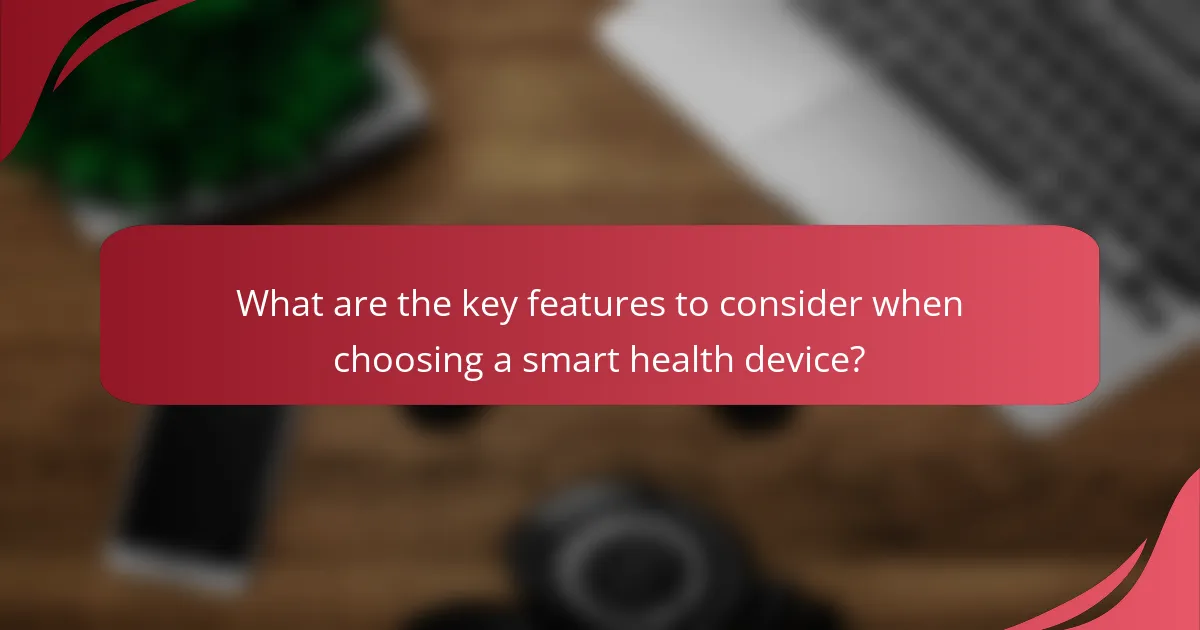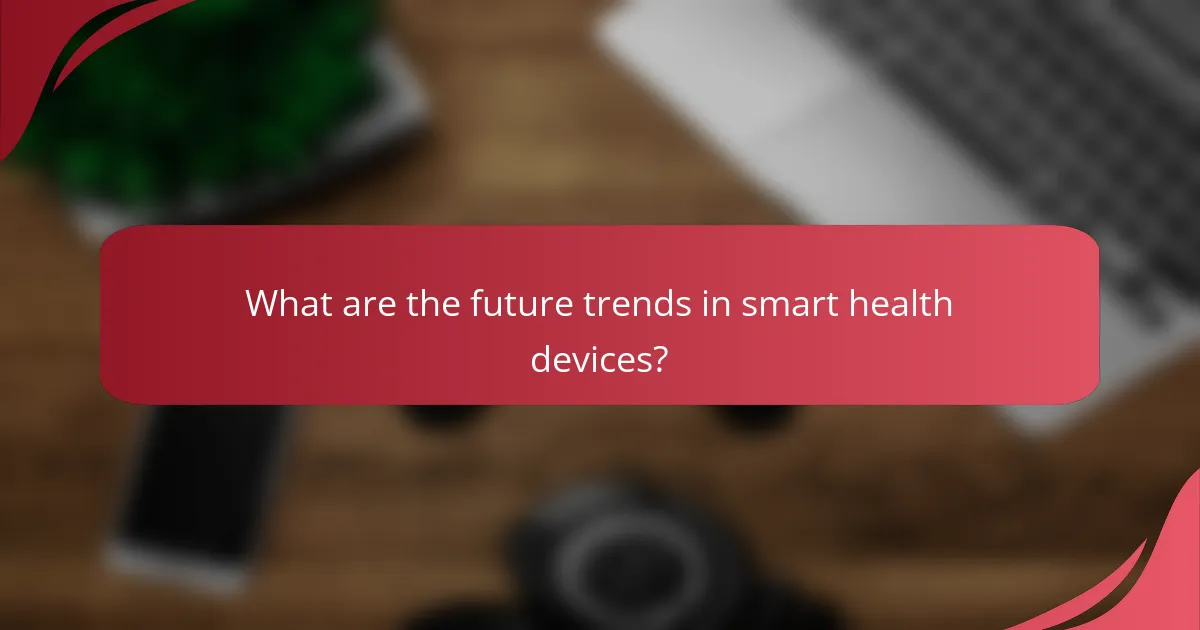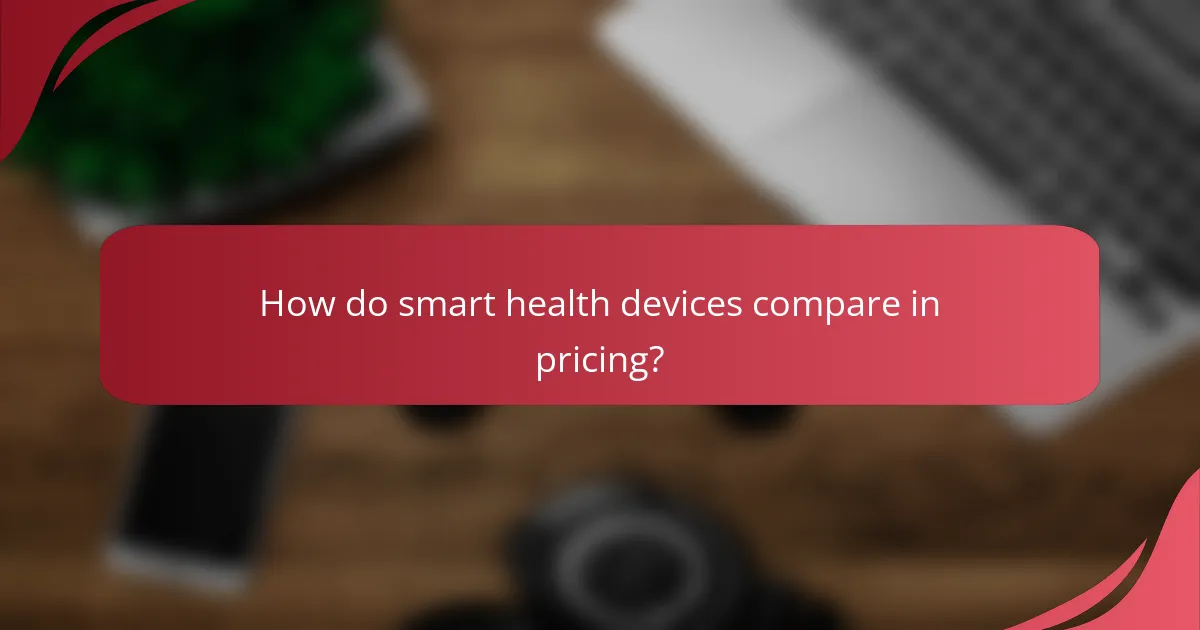Smart health devices are revolutionizing personal wellness through advanced wearables and health monitoring tools that track vital metrics like heart rate, sleep patterns, and body composition. By providing continuous data collection and analysis, these devices empower users to make informed health decisions and proactively manage their well-being. When choosing a smart health device, it’s essential to consider factors such as compatibility, battery life, and data privacy to ensure optimal usability and security.

What are the latest smart health devices available in the market?
The latest smart health devices include advanced wearables and health monitoring tools that enhance personal wellness and fitness tracking. These devices offer features like heart rate monitoring, sleep analysis, and even body composition metrics, making them essential for health-conscious individuals.
Apple Watch Series 9
The Apple Watch Series 9 is a leading smartwatch that integrates health tracking with seamless smartphone connectivity. It features advanced sensors for heart rate, blood oxygen levels, and an improved battery life that lasts up to 18 hours.
Users can benefit from its fitness tracking capabilities, including GPS for outdoor activities and a variety of workout modes. The watch also supports health apps that can help manage stress and monitor sleep patterns.
Fitbit Charge 5
The Fitbit Charge 5 is a versatile fitness tracker that offers comprehensive health insights. It includes features like an ECG app, stress management tools, and daily readiness scores to help users optimize their workouts.
This device is designed for those who prefer a slim profile while still wanting robust health tracking. It provides insights into sleep quality and heart rate variability, making it a solid choice for fitness enthusiasts.
Oura Ring Generation 3
The Oura Ring Generation 3 is a unique health tracker that combines style with functionality. This smart ring monitors sleep, activity, and readiness levels, providing users with personalized insights based on their daily habits.
Its compact design makes it easy to wear all day and night, and it offers detailed sleep analysis, including deep sleep and REM cycles. The ring’s battery lasts up to a week, making it convenient for continuous monitoring.
Samsung Galaxy Watch 6
The Samsung Galaxy Watch 6 is a feature-rich smartwatch that caters to health and fitness enthusiasts. It includes advanced health monitoring features such as body composition analysis and heart rate tracking, along with a vibrant display for easy navigation.
This device supports a wide range of fitness apps and integrates well with Samsung’s ecosystem, allowing users to track workouts and manage their health data effectively. Its battery life can last up to 40 hours, depending on usage.
Withings Body Cardio Scale
The Withings Body Cardio Scale is a smart scale that provides more than just weight measurements. It tracks body composition metrics like fat mass, muscle mass, and water percentage, giving users a comprehensive view of their health.
This scale syncs with the Withings Health Mate app, allowing users to monitor their progress over time. It also features heart rate measurement and can be a valuable tool for anyone looking to manage their weight and overall health effectively.

How are smart health devices improving personal health management?
Smart health devices enhance personal health management by providing continuous data collection and analysis, enabling users to make informed health decisions. These devices empower individuals to monitor their health metrics in real-time, leading to proactive management of their well-being.
Real-time health monitoring
Real-time health monitoring allows users to track vital signs such as heart rate, blood pressure, and glucose levels instantly. Devices like smartwatches and fitness trackers can alert users to significant changes, prompting timely medical intervention if necessary.
For effective monitoring, choose devices that offer accurate readings and are compatible with mobile apps for easy data access. Regularly check device settings to ensure optimal performance and data accuracy.
Personalized health insights
Smart health devices analyze collected data to provide personalized health insights tailored to individual needs. These insights can include recommendations for exercise, diet, and lifestyle changes based on user-specific health metrics.
To maximize the benefits, users should engage with the insights provided, setting realistic health goals and adjusting their routines accordingly. Consider devices that offer customizable feedback to align with personal health objectives.
Integration with telehealth services
Smart health devices increasingly integrate with telehealth services, enabling remote consultations and continuous health monitoring by healthcare professionals. This integration allows for timely interventions and better management of chronic conditions without frequent in-person visits.
When selecting a device, ensure it is compatible with telehealth platforms used by your healthcare provider. This compatibility can streamline communication and enhance the overall effectiveness of your health management strategy.

What are the key features to consider when choosing a smart health device?
When selecting a smart health device, consider compatibility with your smartphone, battery life, and data privacy measures. These features significantly impact usability, convenience, and security, ensuring you choose a device that meets your health monitoring needs effectively.
Compatibility with smartphones
Smart health devices must seamlessly connect with your smartphone for optimal functionality. Check if the device is compatible with your operating system, whether iOS or Android, and ensure it supports the latest app updates for enhanced features.
Some devices may only work with specific brands or models, so verify compatibility before purchasing. For example, certain wearables may offer limited functionality if not paired with a compatible smartphone.
Battery life and charging options
Battery life is crucial for smart health devices, as frequent charging can be inconvenient. Look for devices that offer at least several days of battery life on a single charge to avoid interruptions in monitoring.
Additionally, consider the charging options available. Some devices utilize wireless charging, while others may require a specific cable. Choose a device that fits your lifestyle and charging preferences to ensure ease of use.
Data privacy and security measures
Data privacy is paramount when using smart health devices, as they collect sensitive health information. Ensure the device complies with relevant regulations, such as GDPR in Europe or HIPAA in the United States, to protect your data.
Look for devices that offer robust encryption and clear privacy policies. Check if the manufacturer provides regular software updates to address potential security vulnerabilities, ensuring your information remains secure over time.

What are the future trends in smart health devices?
The future of smart health devices is characterized by advancements in technology that enhance patient care and health monitoring. Key trends include the integration of artificial intelligence, the rise of wearable biosensors, and the use of augmented reality for health management.
AI-driven health analytics
AI-driven health analytics involves using artificial intelligence to process and analyze health data, providing insights that can improve patient outcomes. These systems can identify patterns in large datasets, enabling personalized treatment plans and early detection of health issues.
For instance, AI algorithms can analyze data from various sources, such as electronic health records and wearable devices, to predict potential health risks. This predictive capability allows healthcare providers to intervene proactively, potentially reducing hospital visits and improving overall health management.
Wearable biosensors
Wearable biosensors are devices that monitor physiological parameters in real-time, offering continuous health tracking. These sensors can measure metrics such as heart rate, blood pressure, and glucose levels, providing valuable data for both users and healthcare professionals.
Examples include smartwatches and fitness trackers that not only track physical activity but also monitor vital signs. As technology advances, these devices are becoming more accurate and capable, with some even offering alerts for abnormal readings, which can be crucial for managing chronic conditions.
Augmented reality in health monitoring
Augmented reality (AR) in health monitoring enhances the way patients and healthcare providers interact with medical data. AR can overlay digital information onto the real world, allowing for improved visualization of health metrics and treatment plans.
For example, AR applications can assist surgeons by providing real-time data during procedures or help patients visualize their health progress through interactive interfaces. This technology can lead to better understanding and engagement in personal health management, ultimately improving adherence to treatment protocols.

How do smart health devices compare in pricing?
Smart health devices vary widely in pricing, influenced by features, brand reputation, and technology. Generally, you can find options ranging from budget-friendly devices to premium models, each catering to different user needs and preferences.
Mid-range options like Fitbit
Mid-range devices, such as those offered by Fitbit, typically range from around $100 to $250. These devices often include features like heart rate monitoring, sleep tracking, and basic fitness metrics, making them suitable for casual users who want to improve their health without breaking the bank.
When considering a mid-range option, evaluate the specific features you need. For example, if GPS tracking is important for your outdoor activities, ensure the model you choose includes it, as not all mid-range devices do.
Premium devices like Apple Watch
Premium devices, such as the Apple Watch, usually start at approximately $400 and can exceed $1,000 for advanced models. These devices offer a comprehensive suite of health tracking features, including ECG monitoring, blood oxygen levels, and integration with various health apps.
Investing in a premium device can be worthwhile if you require advanced health metrics and seamless integration with other smart devices. However, be mindful of potential subscription fees for additional services or features that may not be included in the initial purchase price.
Budget-friendly alternatives
Budget-friendly alternatives can be found for as low as $20 to $100, often providing basic functionalities like step counting and calorie tracking. Brands like Xiaomi and Amazfit offer reliable options that cater to users who want essential health monitoring without a hefty price tag.
While these devices may lack advanced features, they can still be effective for users focused on basic fitness goals. Always check user reviews and ratings to ensure the device meets your expectations in terms of accuracy and durability.

What are the benefits of using smart health devices in urban areas?
Smart health devices in urban areas enhance healthcare accessibility, improve health monitoring, and promote preventive care. These devices can provide real-time data, allowing users to manage their health more effectively while reducing the burden on healthcare systems.
Improved Health Monitoring
Smart health devices facilitate continuous health monitoring, enabling users to track vital signs such as heart rate, blood pressure, and glucose levels. This real-time data helps individuals identify potential health issues early, leading to timely interventions.
For example, a smart blood pressure monitor can alert users if their readings exceed normal ranges, prompting them to seek medical advice. This proactive approach is especially beneficial in urban settings where healthcare resources may be stretched thin.
Enhanced Accessibility to Healthcare Services
Urban residents often face challenges accessing healthcare services due to high demand and long wait times. Smart health devices can bridge this gap by connecting users with healthcare professionals through telemedicine platforms. This allows for consultations without the need to travel.
Additionally, wearable devices can send health data directly to doctors, enabling them to monitor patients remotely and adjust treatment plans as necessary. This convenience is crucial in densely populated areas where time and distance can hinder access to care.
Encouragement of Preventive Care
Smart health devices promote preventive care by encouraging users to adopt healthier lifestyles. Many devices come with features that track physical activity, sleep patterns, and nutrition, providing insights that can lead to better health choices.
For instance, a fitness tracker can motivate users to meet daily exercise goals, while a smart scale can help monitor weight changes over time. By fostering a culture of prevention, these devices can reduce the incidence of chronic diseases common in urban populations.


